An Analysis of Leadership and Management in the UK's NHS Healthcare
VerifiedAdded on 2023/01/12
|9
|2854
|69
Report
AI Summary
This report provides a comprehensive analysis of leadership and people management within the UK's National Health Service (NHS). It begins with an introduction to people management, emphasizing the role of the HR department in managing employees and various functions like training, recruitment, and organizational development. The report then delves into key theoretical models, including contingency theory and transitional models, and their application within the NHS. It also examines talent management, particularly focusing on expectancy theory and its impact on employee motivation. Furthermore, the report details the roles and priorities of NHS management, highlighting the importance of training, equal pay, and effective HR functions like recruitment, training & development, and employee relations. The analysis extends to internal and external influences on leadership, management, training & development, and talent management, recognizing the impact of staff, social elements, and healthcare regulations. The report concludes with recommendations for improving NHS management practices, focusing on employee well-being, effective training programs, and strategic HR management.
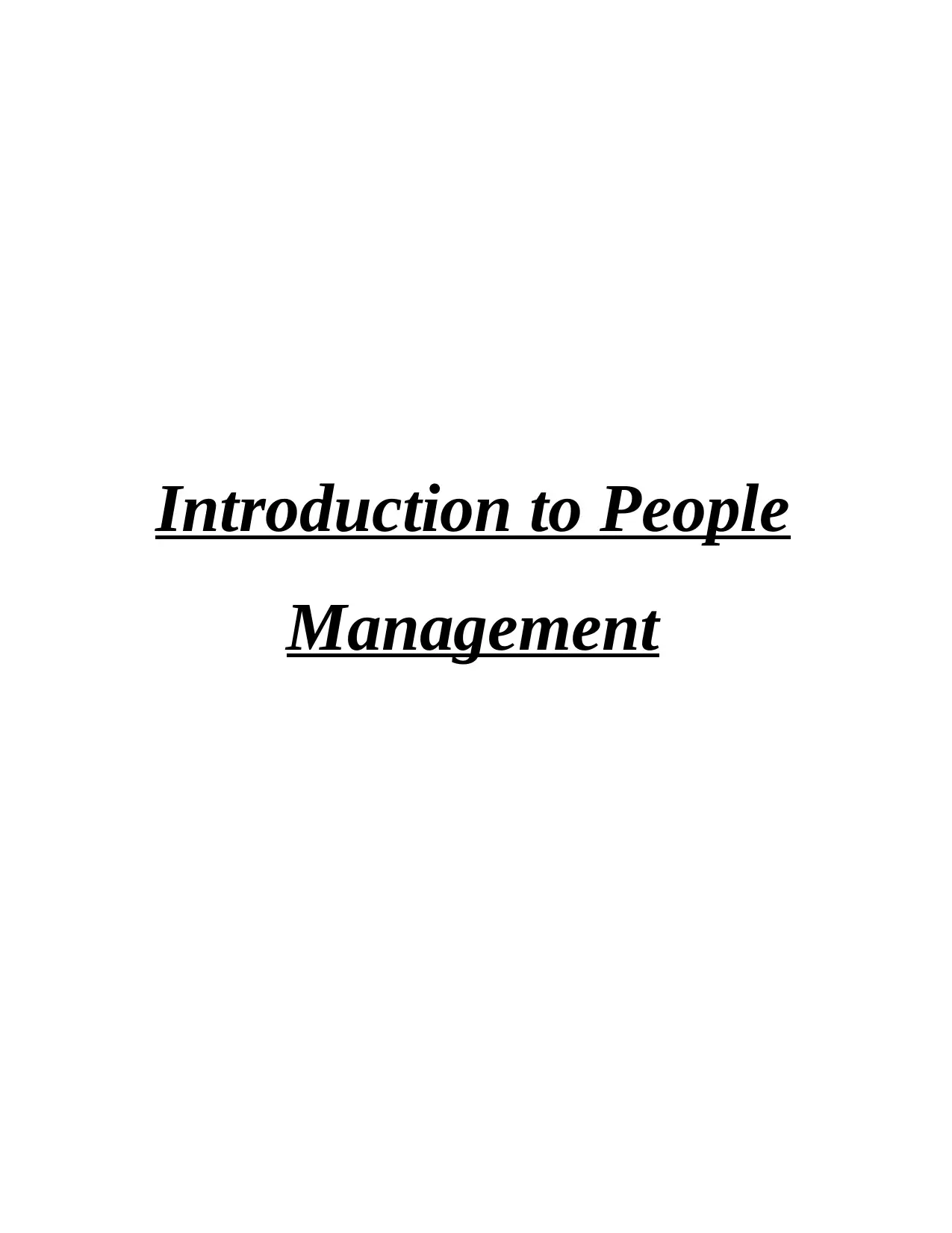
Introduction to People
Management
Management
Paraphrase This Document
Need a fresh take? Get an instant paraphrase of this document with our AI Paraphraser
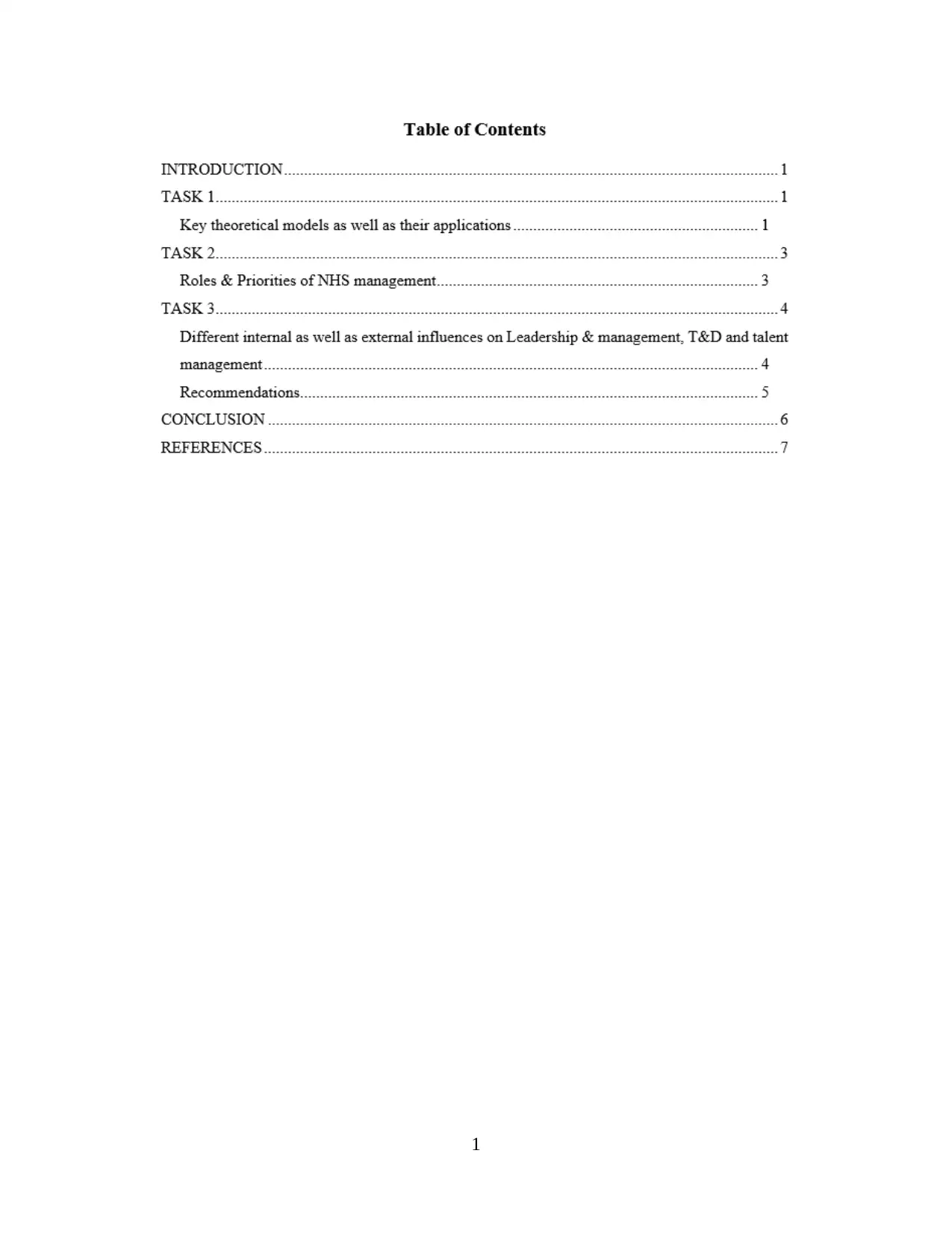
1
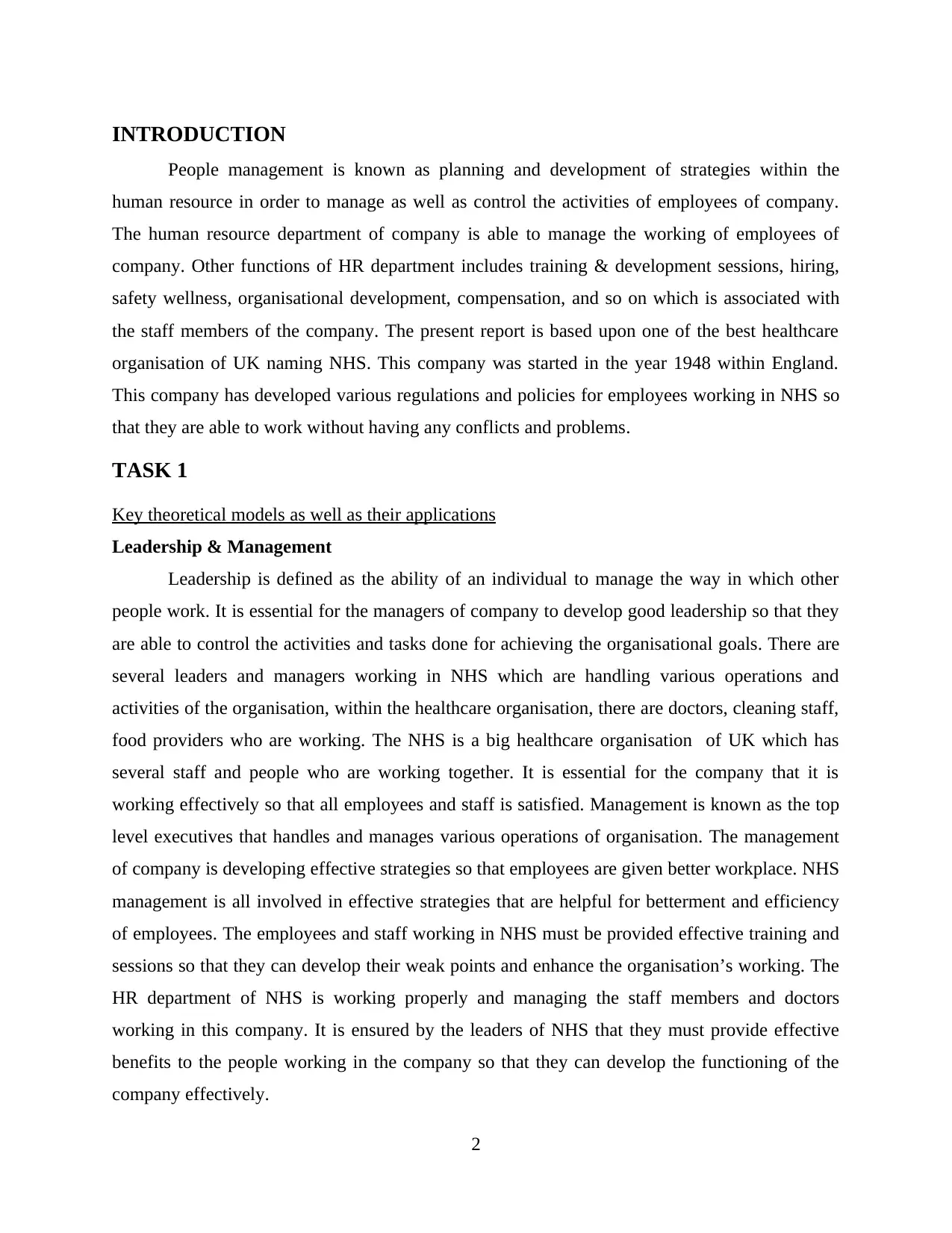
INTRODUCTION
People management is known as planning and development of strategies within the
human resource in order to manage as well as control the activities of employees of company.
The human resource department of company is able to manage the working of employees of
company. Other functions of HR department includes training & development sessions, hiring,
safety wellness, organisational development, compensation, and so on which is associated with
the staff members of the company. The present report is based upon one of the best healthcare
organisation of UK naming NHS. This company was started in the year 1948 within England.
This company has developed various regulations and policies for employees working in NHS so
that they are able to work without having any conflicts and problems.
TASK 1
Key theoretical models as well as their applications
Leadership & Management
Leadership is defined as the ability of an individual to manage the way in which other
people work. It is essential for the managers of company to develop good leadership so that they
are able to control the activities and tasks done for achieving the organisational goals. There are
several leaders and managers working in NHS which are handling various operations and
activities of the organisation, within the healthcare organisation, there are doctors, cleaning staff,
food providers who are working. The NHS is a big healthcare organisation of UK which has
several staff and people who are working together. It is essential for the company that it is
working effectively so that all employees and staff is satisfied. Management is known as the top
level executives that handles and manages various operations of organisation. The management
of company is developing effective strategies so that employees are given better workplace. NHS
management is all involved in effective strategies that are helpful for betterment and efficiency
of employees. The employees and staff working in NHS must be provided effective training and
sessions so that they can develop their weak points and enhance the organisation’s working. The
HR department of NHS is working properly and managing the staff members and doctors
working in this company. It is ensured by the leaders of NHS that they must provide effective
benefits to the people working in the company so that they can develop the functioning of the
company effectively.
2
People management is known as planning and development of strategies within the
human resource in order to manage as well as control the activities of employees of company.
The human resource department of company is able to manage the working of employees of
company. Other functions of HR department includes training & development sessions, hiring,
safety wellness, organisational development, compensation, and so on which is associated with
the staff members of the company. The present report is based upon one of the best healthcare
organisation of UK naming NHS. This company was started in the year 1948 within England.
This company has developed various regulations and policies for employees working in NHS so
that they are able to work without having any conflicts and problems.
TASK 1
Key theoretical models as well as their applications
Leadership & Management
Leadership is defined as the ability of an individual to manage the way in which other
people work. It is essential for the managers of company to develop good leadership so that they
are able to control the activities and tasks done for achieving the organisational goals. There are
several leaders and managers working in NHS which are handling various operations and
activities of the organisation, within the healthcare organisation, there are doctors, cleaning staff,
food providers who are working. The NHS is a big healthcare organisation of UK which has
several staff and people who are working together. It is essential for the company that it is
working effectively so that all employees and staff is satisfied. Management is known as the top
level executives that handles and manages various operations of organisation. The management
of company is developing effective strategies so that employees are given better workplace. NHS
management is all involved in effective strategies that are helpful for betterment and efficiency
of employees. The employees and staff working in NHS must be provided effective training and
sessions so that they can develop their weak points and enhance the organisation’s working. The
HR department of NHS is working properly and managing the staff members and doctors
working in this company. It is ensured by the leaders of NHS that they must provide effective
benefits to the people working in the company so that they can develop the functioning of the
company effectively.
2
⊘ This is a preview!⊘
Do you want full access?
Subscribe today to unlock all pages.

Trusted by 1+ million students worldwide
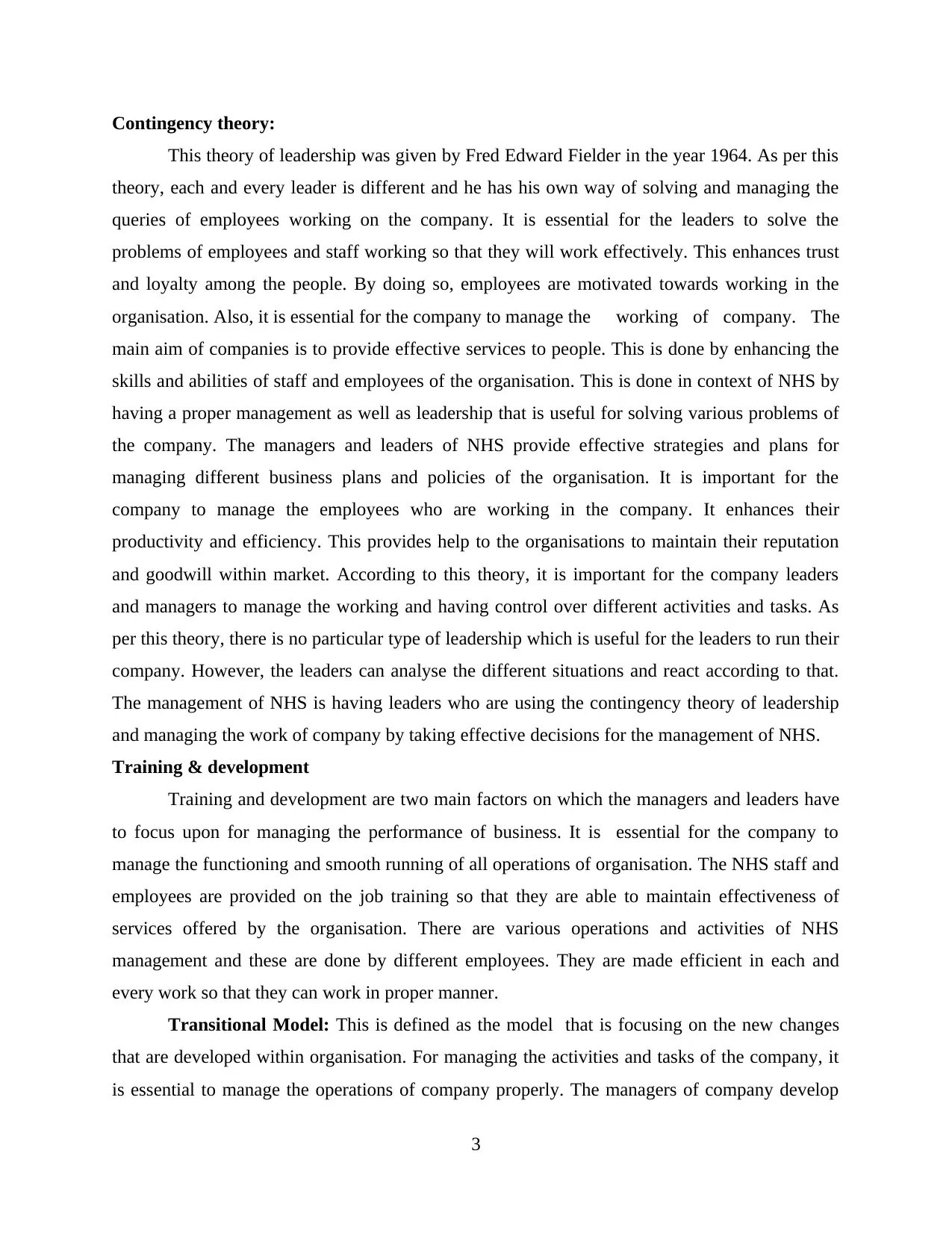
Contingency theory:
This theory of leadership was given by Fred Edward Fielder in the year 1964. As per this
theory, each and every leader is different and he has his own way of solving and managing the
queries of employees working on the company. It is essential for the leaders to solve the
problems of employees and staff working so that they will work effectively. This enhances trust
and loyalty among the people. By doing so, employees are motivated towards working in the
organisation. Also, it is essential for the company to manage the working of company. The
main aim of companies is to provide effective services to people. This is done by enhancing the
skills and abilities of staff and employees of the organisation. This is done in context of NHS by
having a proper management as well as leadership that is useful for solving various problems of
the company. The managers and leaders of NHS provide effective strategies and plans for
managing different business plans and policies of the organisation. It is important for the
company to manage the employees who are working in the company. It enhances their
productivity and efficiency. This provides help to the organisations to maintain their reputation
and goodwill within market. According to this theory, it is important for the company leaders
and managers to manage the working and having control over different activities and tasks. As
per this theory, there is no particular type of leadership which is useful for the leaders to run their
company. However, the leaders can analyse the different situations and react according to that.
The management of NHS is having leaders who are using the contingency theory of leadership
and managing the work of company by taking effective decisions for the management of NHS.
Training & development
Training and development are two main factors on which the managers and leaders have
to focus upon for managing the performance of business. It is essential for the company to
manage the functioning and smooth running of all operations of organisation. The NHS staff and
employees are provided on the job training so that they are able to maintain effectiveness of
services offered by the organisation. There are various operations and activities of NHS
management and these are done by different employees. They are made efficient in each and
every work so that they can work in proper manner.
Transitional Model: This is defined as the model that is focusing on the new changes
that are developed within organisation. For managing the activities and tasks of the company, it
is essential to manage the operations of company properly. The managers of company develop
3
This theory of leadership was given by Fred Edward Fielder in the year 1964. As per this
theory, each and every leader is different and he has his own way of solving and managing the
queries of employees working on the company. It is essential for the leaders to solve the
problems of employees and staff working so that they will work effectively. This enhances trust
and loyalty among the people. By doing so, employees are motivated towards working in the
organisation. Also, it is essential for the company to manage the working of company. The
main aim of companies is to provide effective services to people. This is done by enhancing the
skills and abilities of staff and employees of the organisation. This is done in context of NHS by
having a proper management as well as leadership that is useful for solving various problems of
the company. The managers and leaders of NHS provide effective strategies and plans for
managing different business plans and policies of the organisation. It is important for the
company to manage the employees who are working in the company. It enhances their
productivity and efficiency. This provides help to the organisations to maintain their reputation
and goodwill within market. According to this theory, it is important for the company leaders
and managers to manage the working and having control over different activities and tasks. As
per this theory, there is no particular type of leadership which is useful for the leaders to run their
company. However, the leaders can analyse the different situations and react according to that.
The management of NHS is having leaders who are using the contingency theory of leadership
and managing the work of company by taking effective decisions for the management of NHS.
Training & development
Training and development are two main factors on which the managers and leaders have
to focus upon for managing the performance of business. It is essential for the company to
manage the functioning and smooth running of all operations of organisation. The NHS staff and
employees are provided on the job training so that they are able to maintain effectiveness of
services offered by the organisation. There are various operations and activities of NHS
management and these are done by different employees. They are made efficient in each and
every work so that they can work in proper manner.
Transitional Model: This is defined as the model that is focusing on the new changes
that are developed within organisation. For managing the activities and tasks of the company, it
is essential to manage the operations of company properly. The managers of company develop
3
Paraphrase This Document
Need a fresh take? Get an instant paraphrase of this document with our AI Paraphraser
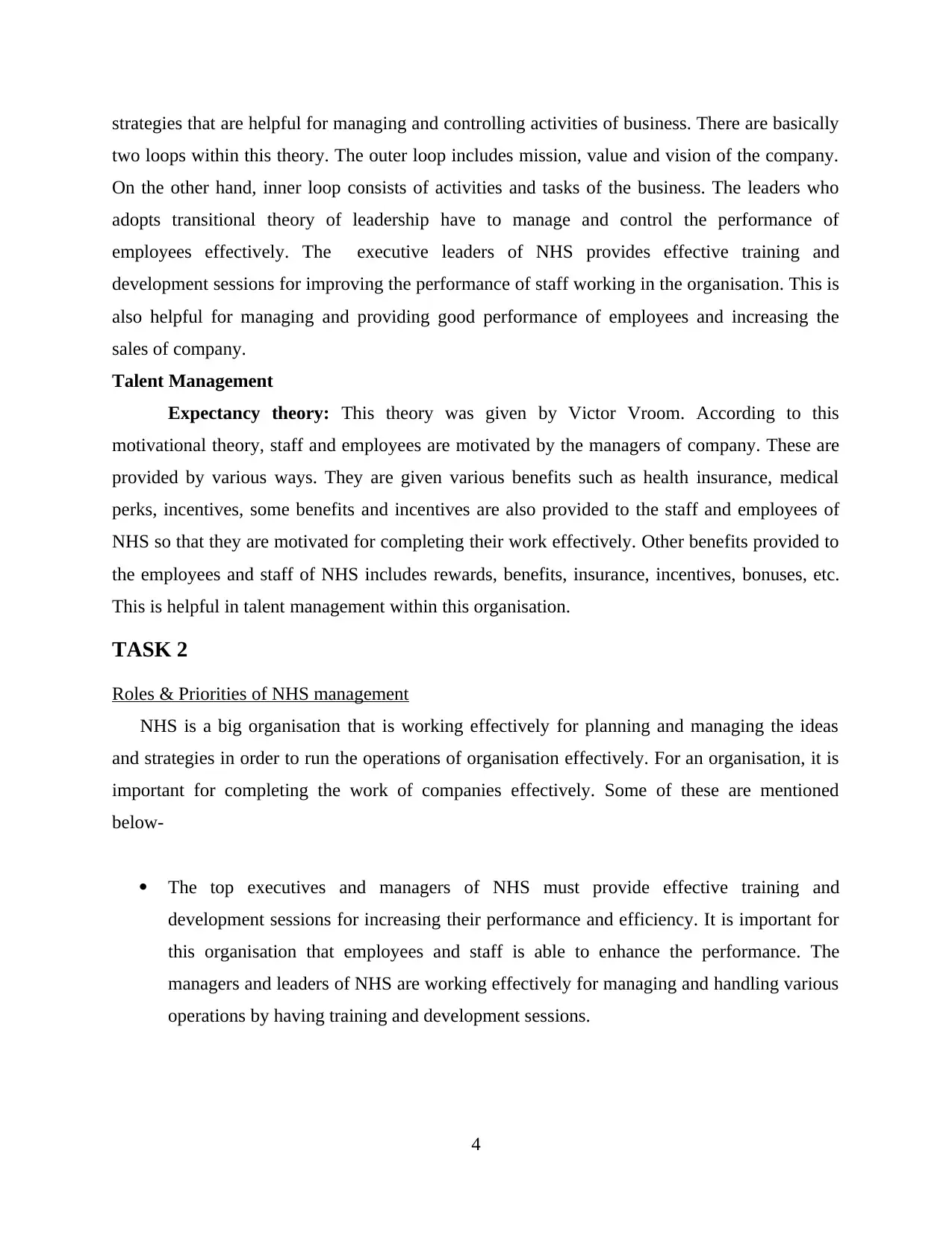
strategies that are helpful for managing and controlling activities of business. There are basically
two loops within this theory. The outer loop includes mission, value and vision of the company.
On the other hand, inner loop consists of activities and tasks of the business. The leaders who
adopts transitional theory of leadership have to manage and control the performance of
employees effectively. The executive leaders of NHS provides effective training and
development sessions for improving the performance of staff working in the organisation. This is
also helpful for managing and providing good performance of employees and increasing the
sales of company.
Talent Management
Expectancy theory: This theory was given by Victor Vroom. According to this
motivational theory, staff and employees are motivated by the managers of company. These are
provided by various ways. They are given various benefits such as health insurance, medical
perks, incentives, some benefits and incentives are also provided to the staff and employees of
NHS so that they are motivated for completing their work effectively. Other benefits provided to
the employees and staff of NHS includes rewards, benefits, insurance, incentives, bonuses, etc.
This is helpful in talent management within this organisation.
TASK 2
Roles & Priorities of NHS management
NHS is a big organisation that is working effectively for planning and managing the ideas
and strategies in order to run the operations of organisation effectively. For an organisation, it is
important for completing the work of companies effectively. Some of these are mentioned
below-
The top executives and managers of NHS must provide effective training and
development sessions for increasing their performance and efficiency. It is important for
this organisation that employees and staff is able to enhance the performance. The
managers and leaders of NHS are working effectively for managing and handling various
operations by having training and development sessions.
4
two loops within this theory. The outer loop includes mission, value and vision of the company.
On the other hand, inner loop consists of activities and tasks of the business. The leaders who
adopts transitional theory of leadership have to manage and control the performance of
employees effectively. The executive leaders of NHS provides effective training and
development sessions for improving the performance of staff working in the organisation. This is
also helpful for managing and providing good performance of employees and increasing the
sales of company.
Talent Management
Expectancy theory: This theory was given by Victor Vroom. According to this
motivational theory, staff and employees are motivated by the managers of company. These are
provided by various ways. They are given various benefits such as health insurance, medical
perks, incentives, some benefits and incentives are also provided to the staff and employees of
NHS so that they are motivated for completing their work effectively. Other benefits provided to
the employees and staff of NHS includes rewards, benefits, insurance, incentives, bonuses, etc.
This is helpful in talent management within this organisation.
TASK 2
Roles & Priorities of NHS management
NHS is a big organisation that is working effectively for planning and managing the ideas
and strategies in order to run the operations of organisation effectively. For an organisation, it is
important for completing the work of companies effectively. Some of these are mentioned
below-
The top executives and managers of NHS must provide effective training and
development sessions for increasing their performance and efficiency. It is important for
this organisation that employees and staff is able to enhance the performance. The
managers and leaders of NHS are working effectively for managing and handling various
operations by having training and development sessions.
4
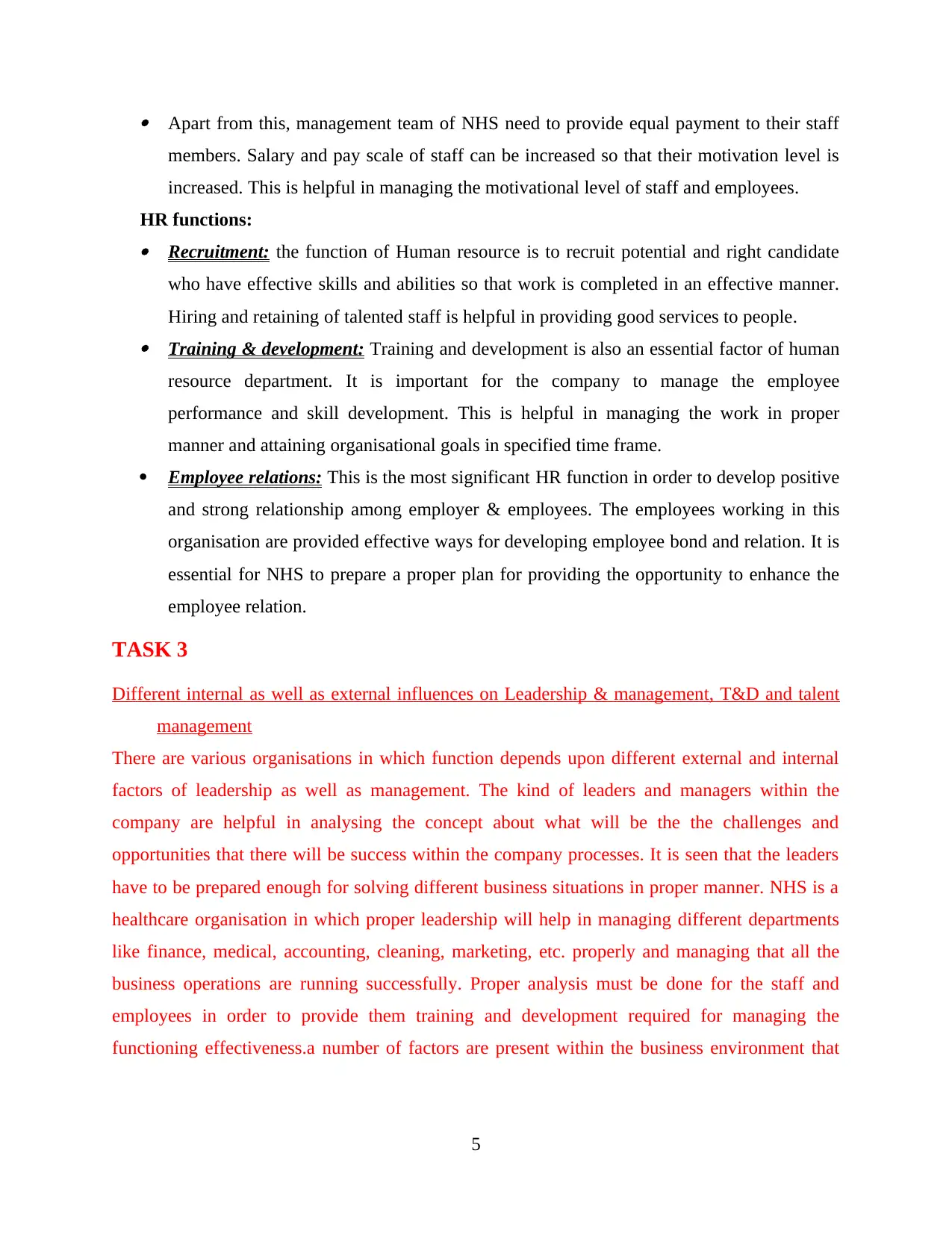
Apart from this, management team of NHS need to provide equal payment to their staff
members. Salary and pay scale of staff can be increased so that their motivation level is
increased. This is helpful in managing the motivational level of staff and employees.
HR functions: Recruitment: the function of Human resource is to recruit potential and right candidate
who have effective skills and abilities so that work is completed in an effective manner.
Hiring and retaining of talented staff is helpful in providing good services to people. Training & development: Training and development is also an essential factor of human
resource department. It is important for the company to manage the employee
performance and skill development. This is helpful in managing the work in proper
manner and attaining organisational goals in specified time frame.
Employee relations: This is the most significant HR function in order to develop positive
and strong relationship among employer & employees. The employees working in this
organisation are provided effective ways for developing employee bond and relation. It is
essential for NHS to prepare a proper plan for providing the opportunity to enhance the
employee relation.
TASK 3
Different internal as well as external influences on Leadership & management, T&D and talent
management
There are various organisations in which function depends upon different external and internal
factors of leadership as well as management. The kind of leaders and managers within the
company are helpful in analysing the concept about what will be the the challenges and
opportunities that there will be success within the company processes. It is seen that the leaders
have to be prepared enough for solving different business situations in proper manner. NHS is a
healthcare organisation in which proper leadership will help in managing different departments
like finance, medical, accounting, cleaning, marketing, etc. properly and managing that all the
business operations are running successfully. Proper analysis must be done for the staff and
employees in order to provide them training and development required for managing the
functioning effectiveness.a number of factors are present within the business environment that
5
members. Salary and pay scale of staff can be increased so that their motivation level is
increased. This is helpful in managing the motivational level of staff and employees.
HR functions: Recruitment: the function of Human resource is to recruit potential and right candidate
who have effective skills and abilities so that work is completed in an effective manner.
Hiring and retaining of talented staff is helpful in providing good services to people. Training & development: Training and development is also an essential factor of human
resource department. It is important for the company to manage the employee
performance and skill development. This is helpful in managing the work in proper
manner and attaining organisational goals in specified time frame.
Employee relations: This is the most significant HR function in order to develop positive
and strong relationship among employer & employees. The employees working in this
organisation are provided effective ways for developing employee bond and relation. It is
essential for NHS to prepare a proper plan for providing the opportunity to enhance the
employee relation.
TASK 3
Different internal as well as external influences on Leadership & management, T&D and talent
management
There are various organisations in which function depends upon different external and internal
factors of leadership as well as management. The kind of leaders and managers within the
company are helpful in analysing the concept about what will be the the challenges and
opportunities that there will be success within the company processes. It is seen that the leaders
have to be prepared enough for solving different business situations in proper manner. NHS is a
healthcare organisation in which proper leadership will help in managing different departments
like finance, medical, accounting, cleaning, marketing, etc. properly and managing that all the
business operations are running successfully. Proper analysis must be done for the staff and
employees in order to provide them training and development required for managing the
functioning effectiveness.a number of factors are present within the business environment that
5
⊘ This is a preview!⊘
Do you want full access?
Subscribe today to unlock all pages.

Trusted by 1+ million students worldwide
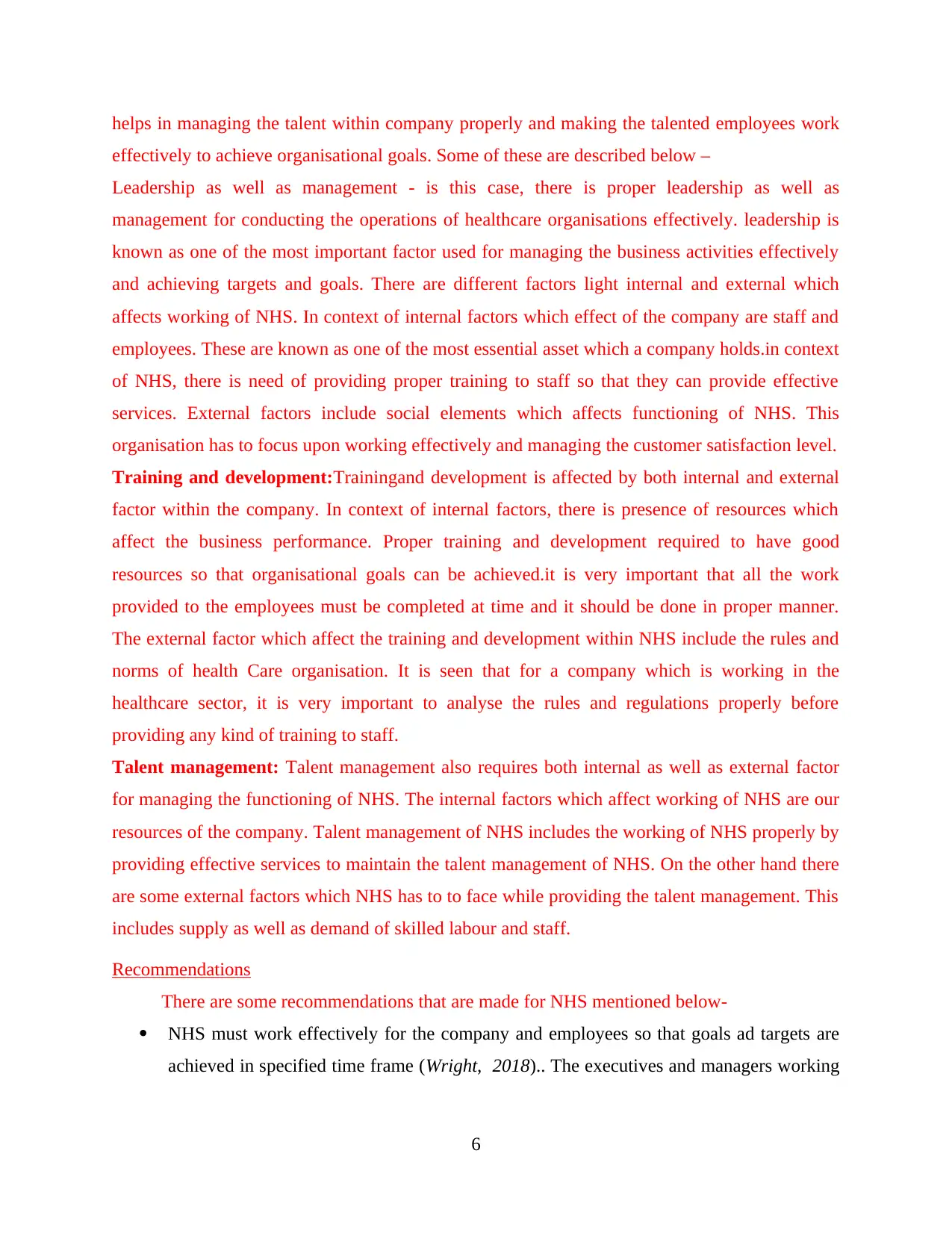
helps in managing the talent within company properly and making the talented employees work
effectively to achieve organisational goals. Some of these are described below –
Leadership as well as management - is this case, there is proper leadership as well as
management for conducting the operations of healthcare organisations effectively. leadership is
known as one of the most important factor used for managing the business activities effectively
and achieving targets and goals. There are different factors light internal and external which
affects working of NHS. In context of internal factors which effect of the company are staff and
employees. These are known as one of the most essential asset which a company holds.in context
of NHS, there is need of providing proper training to staff so that they can provide effective
services. External factors include social elements which affects functioning of NHS. This
organisation has to focus upon working effectively and managing the customer satisfaction level.
Training and development:Trainingand development is affected by both internal and external
factor within the company. In context of internal factors, there is presence of resources which
affect the business performance. Proper training and development required to have good
resources so that organisational goals can be achieved.it is very important that all the work
provided to the employees must be completed at time and it should be done in proper manner.
The external factor which affect the training and development within NHS include the rules and
norms of health Care organisation. It is seen that for a company which is working in the
healthcare sector, it is very important to analyse the rules and regulations properly before
providing any kind of training to staff.
Talent management: Talent management also requires both internal as well as external factor
for managing the functioning of NHS. The internal factors which affect working of NHS are our
resources of the company. Talent management of NHS includes the working of NHS properly by
providing effective services to maintain the talent management of NHS. On the other hand there
are some external factors which NHS has to to face while providing the talent management. This
includes supply as well as demand of skilled labour and staff.
Recommendations
There are some recommendations that are made for NHS mentioned below-
NHS must work effectively for the company and employees so that goals ad targets are
achieved in specified time frame (Wright, 2018).. The executives and managers working
6
effectively to achieve organisational goals. Some of these are described below –
Leadership as well as management - is this case, there is proper leadership as well as
management for conducting the operations of healthcare organisations effectively. leadership is
known as one of the most important factor used for managing the business activities effectively
and achieving targets and goals. There are different factors light internal and external which
affects working of NHS. In context of internal factors which effect of the company are staff and
employees. These are known as one of the most essential asset which a company holds.in context
of NHS, there is need of providing proper training to staff so that they can provide effective
services. External factors include social elements which affects functioning of NHS. This
organisation has to focus upon working effectively and managing the customer satisfaction level.
Training and development:Trainingand development is affected by both internal and external
factor within the company. In context of internal factors, there is presence of resources which
affect the business performance. Proper training and development required to have good
resources so that organisational goals can be achieved.it is very important that all the work
provided to the employees must be completed at time and it should be done in proper manner.
The external factor which affect the training and development within NHS include the rules and
norms of health Care organisation. It is seen that for a company which is working in the
healthcare sector, it is very important to analyse the rules and regulations properly before
providing any kind of training to staff.
Talent management: Talent management also requires both internal as well as external factor
for managing the functioning of NHS. The internal factors which affect working of NHS are our
resources of the company. Talent management of NHS includes the working of NHS properly by
providing effective services to maintain the talent management of NHS. On the other hand there
are some external factors which NHS has to to face while providing the talent management. This
includes supply as well as demand of skilled labour and staff.
Recommendations
There are some recommendations that are made for NHS mentioned below-
NHS must work effectively for the company and employees so that goals ad targets are
achieved in specified time frame (Wright, 2018).. The executives and managers working
6
Paraphrase This Document
Need a fresh take? Get an instant paraphrase of this document with our AI Paraphraser
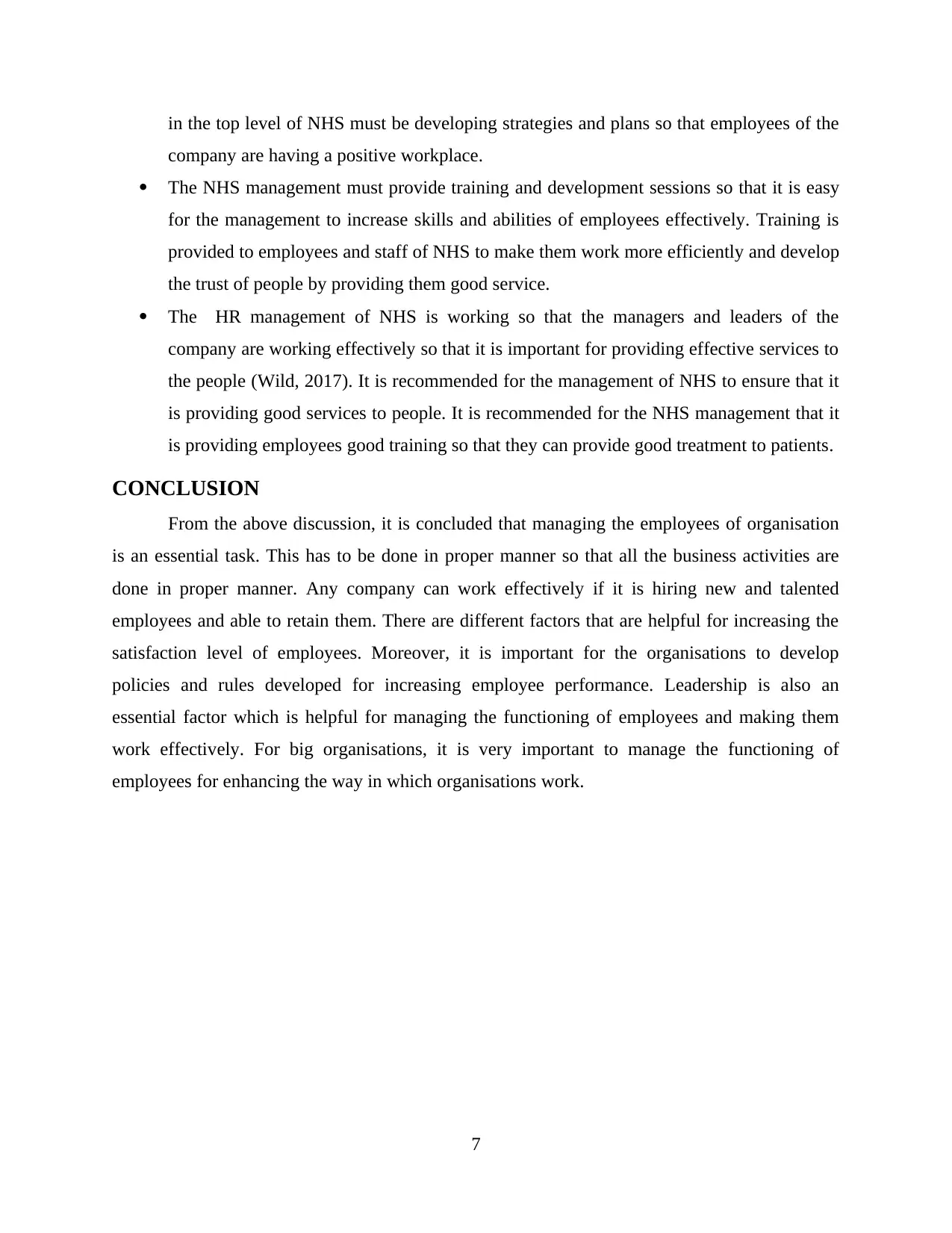
in the top level of NHS must be developing strategies and plans so that employees of the
company are having a positive workplace.
The NHS management must provide training and development sessions so that it is easy
for the management to increase skills and abilities of employees effectively. Training is
provided to employees and staff of NHS to make them work more efficiently and develop
the trust of people by providing them good service.
The HR management of NHS is working so that the managers and leaders of the
company are working effectively so that it is important for providing effective services to
the people (Wild, 2017). It is recommended for the management of NHS to ensure that it
is providing good services to people. It is recommended for the NHS management that it
is providing employees good training so that they can provide good treatment to patients.
CONCLUSION
From the above discussion, it is concluded that managing the employees of organisation
is an essential task. This has to be done in proper manner so that all the business activities are
done in proper manner. Any company can work effectively if it is hiring new and talented
employees and able to retain them. There are different factors that are helpful for increasing the
satisfaction level of employees. Moreover, it is important for the organisations to develop
policies and rules developed for increasing employee performance. Leadership is also an
essential factor which is helpful for managing the functioning of employees and making them
work effectively. For big organisations, it is very important to manage the functioning of
employees for enhancing the way in which organisations work.
7
company are having a positive workplace.
The NHS management must provide training and development sessions so that it is easy
for the management to increase skills and abilities of employees effectively. Training is
provided to employees and staff of NHS to make them work more efficiently and develop
the trust of people by providing them good service.
The HR management of NHS is working so that the managers and leaders of the
company are working effectively so that it is important for providing effective services to
the people (Wild, 2017). It is recommended for the management of NHS to ensure that it
is providing good services to people. It is recommended for the NHS management that it
is providing employees good training so that they can provide good treatment to patients.
CONCLUSION
From the above discussion, it is concluded that managing the employees of organisation
is an essential task. This has to be done in proper manner so that all the business activities are
done in proper manner. Any company can work effectively if it is hiring new and talented
employees and able to retain them. There are different factors that are helpful for increasing the
satisfaction level of employees. Moreover, it is important for the organisations to develop
policies and rules developed for increasing employee performance. Leadership is also an
essential factor which is helpful for managing the functioning of employees and making them
work effectively. For big organisations, it is very important to manage the functioning of
employees for enhancing the way in which organisations work.
7
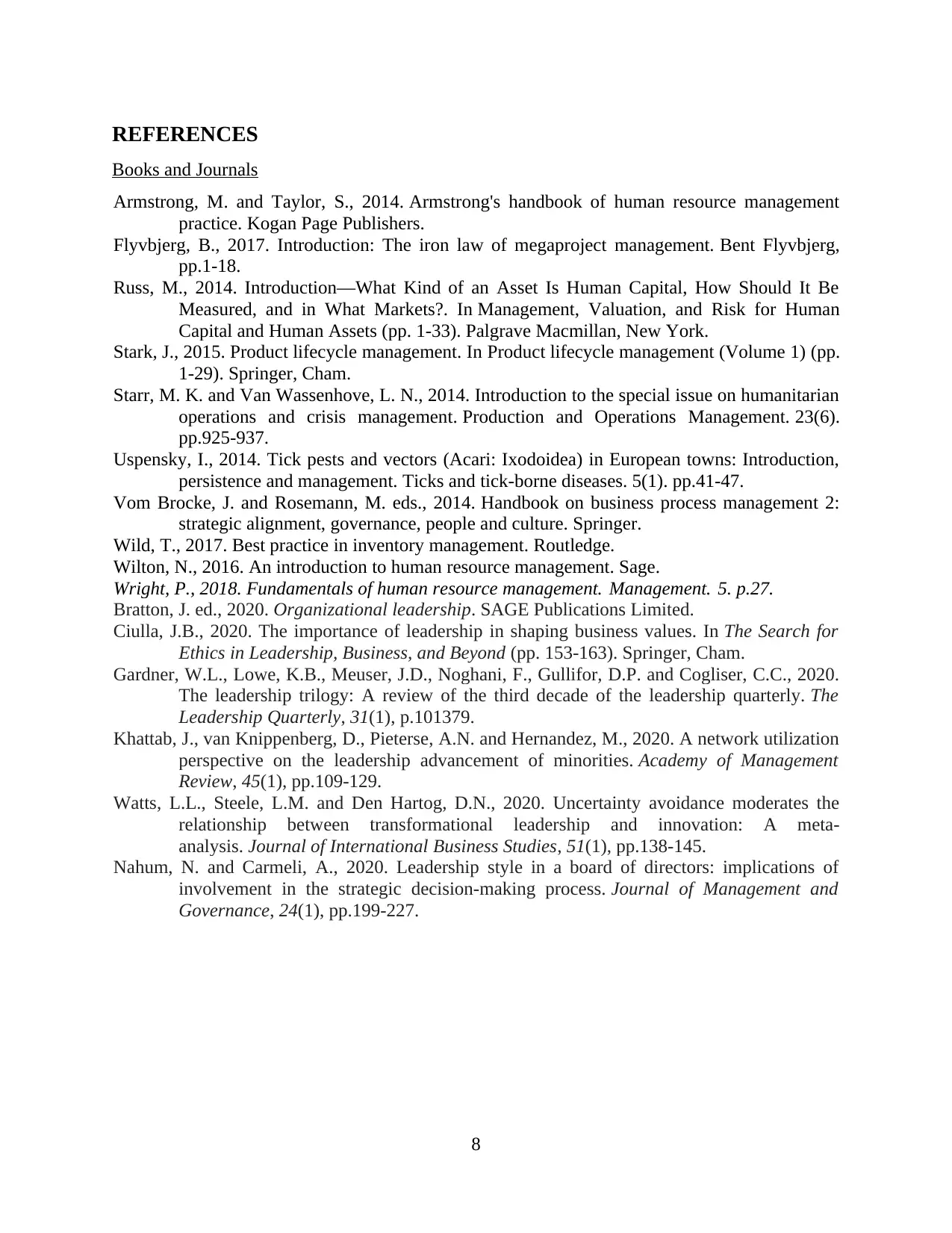
REFERENCES
Books and Journals
Armstrong, M. and Taylor, S., 2014. Armstrong's handbook of human resource management
practice. Kogan Page Publishers.
Flyvbjerg, B., 2017. Introduction: The iron law of megaproject management. Bent Flyvbjerg,
pp.1-18.
Russ, M., 2014. Introduction—What Kind of an Asset Is Human Capital, How Should It Be
Measured, and in What Markets?. In Management, Valuation, and Risk for Human
Capital and Human Assets (pp. 1-33). Palgrave Macmillan, New York.
Stark, J., 2015. Product lifecycle management. In Product lifecycle management (Volume 1) (pp.
1-29). Springer, Cham.
Starr, M. K. and Van Wassenhove, L. N., 2014. Introduction to the special issue on humanitarian
operations and crisis management. Production and Operations Management. 23(6).
pp.925-937.
Uspensky, I., 2014. Tick pests and vectors (Acari: Ixodoidea) in European towns: Introduction,
persistence and management. Ticks and tick-borne diseases. 5(1). pp.41-47.
Vom Brocke, J. and Rosemann, M. eds., 2014. Handbook on business process management 2:
strategic alignment, governance, people and culture. Springer.
Wild, T., 2017. Best practice in inventory management. Routledge.
Wilton, N., 2016. An introduction to human resource management. Sage.
Wright, P., 2018. Fundamentals of human resource management. Management. 5. p.27.
Bratton, J. ed., 2020. Organizational leadership. SAGE Publications Limited.
Ciulla, J.B., 2020. The importance of leadership in shaping business values. In The Search for
Ethics in Leadership, Business, and Beyond (pp. 153-163). Springer, Cham.
Gardner, W.L., Lowe, K.B., Meuser, J.D., Noghani, F., Gullifor, D.P. and Cogliser, C.C., 2020.
The leadership trilogy: A review of the third decade of the leadership quarterly. The
Leadership Quarterly, 31(1), p.101379.
Khattab, J., van Knippenberg, D., Pieterse, A.N. and Hernandez, M., 2020. A network utilization
perspective on the leadership advancement of minorities. Academy of Management
Review, 45(1), pp.109-129.
Watts, L.L., Steele, L.M. and Den Hartog, D.N., 2020. Uncertainty avoidance moderates the
relationship between transformational leadership and innovation: A meta-
analysis. Journal of International Business Studies, 51(1), pp.138-145.
Nahum, N. and Carmeli, A., 2020. Leadership style in a board of directors: implications of
involvement in the strategic decision-making process. Journal of Management and
Governance, 24(1), pp.199-227.
8
Books and Journals
Armstrong, M. and Taylor, S., 2014. Armstrong's handbook of human resource management
practice. Kogan Page Publishers.
Flyvbjerg, B., 2017. Introduction: The iron law of megaproject management. Bent Flyvbjerg,
pp.1-18.
Russ, M., 2014. Introduction—What Kind of an Asset Is Human Capital, How Should It Be
Measured, and in What Markets?. In Management, Valuation, and Risk for Human
Capital and Human Assets (pp. 1-33). Palgrave Macmillan, New York.
Stark, J., 2015. Product lifecycle management. In Product lifecycle management (Volume 1) (pp.
1-29). Springer, Cham.
Starr, M. K. and Van Wassenhove, L. N., 2014. Introduction to the special issue on humanitarian
operations and crisis management. Production and Operations Management. 23(6).
pp.925-937.
Uspensky, I., 2014. Tick pests and vectors (Acari: Ixodoidea) in European towns: Introduction,
persistence and management. Ticks and tick-borne diseases. 5(1). pp.41-47.
Vom Brocke, J. and Rosemann, M. eds., 2014. Handbook on business process management 2:
strategic alignment, governance, people and culture. Springer.
Wild, T., 2017. Best practice in inventory management. Routledge.
Wilton, N., 2016. An introduction to human resource management. Sage.
Wright, P., 2018. Fundamentals of human resource management. Management. 5. p.27.
Bratton, J. ed., 2020. Organizational leadership. SAGE Publications Limited.
Ciulla, J.B., 2020. The importance of leadership in shaping business values. In The Search for
Ethics in Leadership, Business, and Beyond (pp. 153-163). Springer, Cham.
Gardner, W.L., Lowe, K.B., Meuser, J.D., Noghani, F., Gullifor, D.P. and Cogliser, C.C., 2020.
The leadership trilogy: A review of the third decade of the leadership quarterly. The
Leadership Quarterly, 31(1), p.101379.
Khattab, J., van Knippenberg, D., Pieterse, A.N. and Hernandez, M., 2020. A network utilization
perspective on the leadership advancement of minorities. Academy of Management
Review, 45(1), pp.109-129.
Watts, L.L., Steele, L.M. and Den Hartog, D.N., 2020. Uncertainty avoidance moderates the
relationship between transformational leadership and innovation: A meta-
analysis. Journal of International Business Studies, 51(1), pp.138-145.
Nahum, N. and Carmeli, A., 2020. Leadership style in a board of directors: implications of
involvement in the strategic decision-making process. Journal of Management and
Governance, 24(1), pp.199-227.
8
⊘ This is a preview!⊘
Do you want full access?
Subscribe today to unlock all pages.

Trusted by 1+ million students worldwide
1 out of 9
Related Documents
Your All-in-One AI-Powered Toolkit for Academic Success.
+13062052269
info@desklib.com
Available 24*7 on WhatsApp / Email
![[object Object]](/_next/static/media/star-bottom.7253800d.svg)
Unlock your academic potential
Copyright © 2020–2026 A2Z Services. All Rights Reserved. Developed and managed by ZUCOL.





